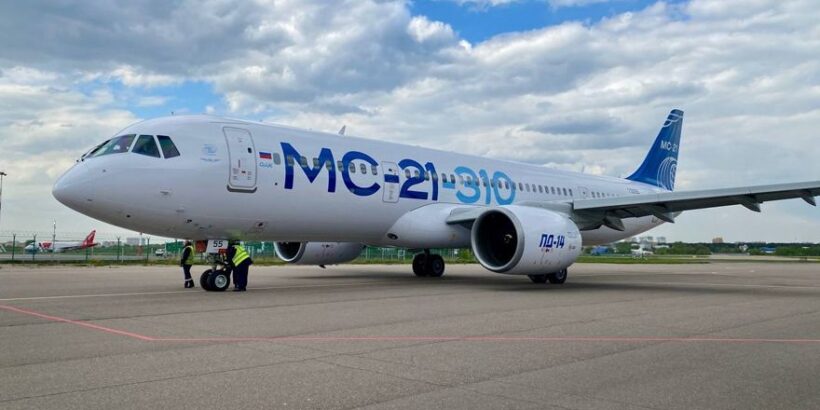The MC-21-310 prototype aircraft, tail number 73055 (MS.0012), completed a ferry flight from Irkutsk to Zhukovsky on May 7, 2025. This aircraft features partially indigenized equipment, including the PD-14 engines, a fully replaced electrical power system (EPS), and domestically produced Inertial Reference Systems (IRS) and Auxiliary Power Unit (APU, TA-18-200). Selected components of the Environmental Control System/Air Conditioning and Ram Air Delivery (ECS/ACRAD) system have also been replaced, including valves and ducting. Furthermore, the cockpit panels and all electric hydraulic pumps are of domestic origin. Following two refinement flights in Irkutsk earlier in May, the aircraft returned to Ramenskoye Airfield after a hiatus of one year and ten months, resuming flight testing on May 29.
“The aircraft is undergoing a cycle of testing for the domestically produced electrical power system, which has been replaced. We anticipate continuing the flight test program through the end of May, meaning that this aircraft will fly again and perform test flights,” noted Pavel Sokut, Head of Flight Testing for the MC-21 program.
According to Mr. Sokut, ground testing is an integral part of aircraft certification, equivalent in scope to flight testing. The certification program includes a ground testing section that is as extensive as the flight testing section. This work is performed by the same team, as certain evaluations and demonstrations for certification authorities must occur on the ground prior to flight, while other evaluations are critically dependent on ground demonstration for certification purposes.
“Before entering the certification testing phase, we conduct a series of factory refinement tests, both flight and ground tests. During these tests, we verify that the aircraft is ready for certification and ready to be presented to the certification authorities and aviation registry experts. If the factory tests reveal the need for modifications, engineering documentation is promptly issued, and the modifications are implemented on the aircraft by the involved vendors and the factory team,” stated Pavel Sokut.
* * *
Ural Airlines has expressed interest in acquiring the MC-21, but lacks firm contracts due to the absence of finalized aircraft performance specifications. Discussions regarding a potential contract for the supply of these new domestically produced aircraft to the carrier took place on May 28, involving Dmitry Yadrov, Head of the Federal Air Transport Agency (Rosaviatsiya), and Kirill Skuratov, CEO of Ural Airlines. Currently, Ural Airlines’ fleet comprises A319, A320, and A321 aircraft.
The interest in the MC-21 stems from the desire to diversify the fleet and reduce reliance on foreign manufacturers. However, the MC-21’s lack of readiness for commercial operations and the absence of certification for the MC-21-310 variant are hindering decision-making. A similar situation exists among other Russian airlines.
* * *
The Altai Tire Plant, in conjunction with YASHZ Avia LLC, has completed qualification testing of tubeless radial tires for the MC-21-310 and Superjet 100 aircraft. The tires meet the requirements of Yakovlev PJSC. Preliminary testing in China in 2023 enabled adjustments to the engineering documentation. Testing of the nose landing gear tires occurred in October-November 2024, and main landing gear tires in December 2024 and March 2025, leading to successful qualification on the first attempt.
Certification for three tire sizes is currently underway, and development of a tire for the Superjet 100 nose gear is also in progress, with the first prototype planned for completion by the end of 2025. The creation of domestically produced aircraft tires mitigates supply disruption risks in the face of sanctions and enhances import substitution in the aviation industry. This is a significant step towards ensuring technological independence in component manufacturing.
* * *
The Ulyanovsk branch of Aerocomposit JSC has received funding of RUB 1.78 billion for production modernization. The funds will be used to acquire 11 units of modern equipment, including five-axis milling centers for processing titanium and aluminum alloy blanks. The production focus is on manufacturing metallic components for the MC-21 composite wing consoles. The equipment will improve component precision and production rate.
The modernization is linked to the technical re-equipment program and the development of the aviation industry through 2030. Aerocomposit JSC manufactures structural components from polymer composite materials and plays a key role in the production of the MC-21 wing.
* * *
Anatoly Gaidansky, Deputy General Director of Yakovlev PJSC, stated that approximately 220-230 flights are required for the final certification of the MC-21 by the two prototype aircraft, 73055 and 73057. The company anticipates completing the work by the end of the summer of 2026 and commencing deliveries to airlines in the fall.
* * *
In May 2025, the MC-21 prototype aircraft s/n 73054 and 73055 completed six flights for factory refinement and certification testing, totaling 21 hours and 37 minutes.
On May 29, aircraft 73055 took off from the Gromov Flight Research Institute (LII) airfield in Ramenskoye, and before entering the test flight area (Sasovo – Zubova Polyana – Torbeevo), the crew paid tribute to Sergey Tresvyatsky, a distinguished test pilot of the Russian Federation, by flying over the Bykovo Memorial Cemetery.
On May 28, aircraft 73054 performed a flight from Ramenskoye to Tatarstan, where it made several circles over Kazan at low altitude for over an hour before returning to the Moscow region. The flight was conducted to evaluate a domestically produced transponder and other radio communication equipment.
A transponder is a device that automatically transmits aircraft data, including identification, altitude, speed, and heading, in response to radar and other aircraft requests. It is designed to ensure air traffic safety.
The flight assessed the accuracy of data transmission by the transponder, compatibility with ground systems, the quality of radio communication with air traffic control, the reliability of system operation in real-world conditions, and compliance with noise and electromagnetic compatibility standards. These flights are part of the MC-21 certification program with Russian-made components.


